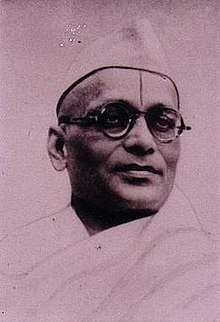P. T. Narasimhachar
Purohita Thirunarayana Narasimhachar (17 March 1905 – 23 October 1998), commonly known as PuTiNa, was a playwright and poet in the Kannada language. Along with, Kuvempu and D. R. Bendre, he forms the well-known trio of Kannada Navodaya poets.[1] He is a Sahitya Akademi fellow and the a winner of the Pampa Award, awarded by the Government of Karnataka in 1991.[2]
P. T. Narasimhachar (Pu Ti Na) | |
|---|---|
 Kamat's Potpourri | |
| Born | 17 March 1905 Melukote, Pandavapura taluk, Mandya district, Karnataka |
| Died | 13 October 1998 (aged 93) Bangalore, Karnataka |
| Pen name | Pu Ti Na (ಪು ತಿ ನ) |
| Occupation | Writer, poet |
| Nationality | India |
| Genre | Fiction |
| Literary movement | Kannada: Navodaya |
Life and career
PuTiNa was born on 17 March 1905 into an orthodox Iyengar family in the town of Melkote in Mandya district of Karnataka.[3]
Apart from being a writer, PuTiNa also worked in the army of Mysore state and later in the legislature of the Government of Mysore state.[4] He died on 23 October 1998.
Literary contributions
PuTiNa was one of the catalysts of the Navodaya style of Kannada literature. According to Lakshminarayana Bhat, "At a broader level, the growth of the Navodaya style of literature resembles the growth of the writings of PuTiNa".[5] In his first collection of poems Hanathe, he conveys profound insights into significant moments in life by using a simple language and style. Many of PuTiNa's writings detail the beauty and majesty of nature, bordering on the spiritual.[6] Two of his well-known writings are Ahalye, which subtly narrates the conflict between kama and dharma, and Gokula Nirgamana, which narrates the departure of Krishna from Gokula.[7] PuTiNa's essays reflect his dominant poetic personality.[8]
Awards and recognitions
PuTiNa's awards and recognitions include:
- Padma Shri from the Government of India, 1991[9]
Bibliography
Collection of poems
- Hanate
- Mandaliru
- Sharadayaamini
- Hrudaya vihari
- Ganesha darshana
- Rasa Sarasvati
- Maley Degula
- Irula Meragu
- Haley Chiguru – Hosa Beru
- Raaga raagini
- honala haadu
Musical dramas
- Vasanta Chandana
- Seeta Kalyana
- Ahalye
- Gokula Nirgamana
- Shabari
- Doniya Binada
- Vikatakavi
- Ramapatabisheka
Collection of stories
- Ramachariya Nenapu
- Rathasaptami and other stories
- Sri Rama Pattabhiskekham
- Hamsa Damayanti
- Eechalu marad kelage
Notes
- K. M. George (1992), p642
- P. T. Narasimhachar (2001), Back cover
- "Birth centenary of PuTiNa". ThatsKannada.com.
- "House of PuTiNa at Melkote is a cultural icon". ThatsKannada.com. Retrieved 21 March 2009.
- "An analysis of Pu. Ti. Narasimhachar's work". OurKarnataka.com. Retrieved 21 March 2009.
- K. M. George (1992), p174
- Sisir Kumar Das (1995), p766
- Amaresh Datta (1988), p1220
- "Padma Awards" (PDF). Ministry of Home Affairs, Government of India. 2015. Retrieved 21 July 2015.
References
- K. M. George (1992) [1992]. Modern Indian Literature, an Anthology: Surveys and poems. Sahitya Akademi. ISBN 978-81-7201-324-0.
- P. T. Narasimhachar (2001) [2001]. Hill Temple. Sahitya Akademi. ISBN 978-81-260-0814-8.
- Amaresh Datta (1988). Encyclopaedia of Indian literature vol. 2. Sahitya Akademi. p. 1142. ISBN 81-260-1194-7.
- Sisir Kumar Das, various (1995). A History of Indian Literature. Sahitya Akademi. ISBN 81-7201-798-7.
- Documentary by Chadrashekhar Kambar